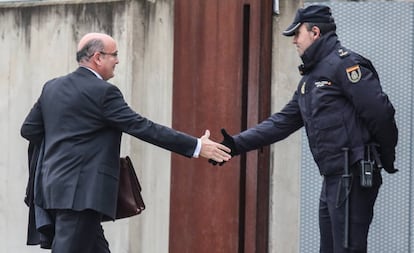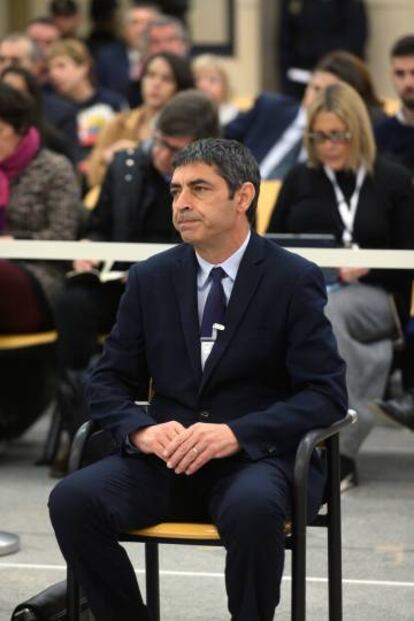Civil Guard colonel slams actions of Mossos chief during Catalan independence drive
Diego Pérez de los Cobos tells court he would have removed Josep Lluís Trapero from his role as head of the regional police force for his leadership in 2017

Monday saw the start of the second week of a trial of four figures connected to the Catalan police force, the Mossos d’Esquadra, for their actions in the 2017 independence drive in the northeastern Spanish region. They are accused of having played a “key role” in the secessionist movement and are facing charges of rebellion and sedition.
Today saw an appearance as a witness by Diego Pérez de los Cobos, a Civil Guard colonel who was in charge of the law-enforcement agency’s units on the ground in Catalonia on October 1, 2017, the day that the illegal referendum on independence was held in Catalonia. A unilateral declaration of independence was passed by the regional parliament later that same month.
I didn’t see any desire to cooperate on his part
Diego Pérez de los Cobos, Civil Guard colonel
The key defendant in this new case is Josep Lluís Trapero, the then-chief of the Mossos d’Esquadra. He was sacked from his position in 2017, after four years in charge of the regional force, in the wake of the central government taking over the regional powers in Catalonia under Article 155 of the Constitution, a measure that was implemented after the unilateral declaration of independence was passed. Trapero is being accused of not having done enough to prevent the referendum from taking place.
The sixth day of the court case saw De los Cobos fiercely criticize the actions of Trapero. “If I had been in charge of the Mossos, my first decision would have been to remove Trapero from his role, as he was constantly putting spokes in the wheels,” the Civil Guard chief told the court.
When questioned by the public prosecutor, De los Cobos went even further in his criticism of Trapero. “I didn’t see any desire to cooperate on his part,” he said. “I told Trapero that with the [planned Mossos police presence] the referendum could not be stopped,” Pérez de los Cobos added. “That rather, it was geared toward covering legal elections.”

This claim is in line with the arguments of the public prosecutor, who has stated that the Mossos displayed an intentionally passive attitude during the 2017 pro-independence drive, in line with the secessionist politicians, in order to facilitate the holding of the vote.
De los Cobos also told the court that “at no time” did the regional police call for help from the state forces on hand: the Civil Guard and the National Police. This was expected if the authorities were to comply with the court ruling that ordered them to stop the illegal referendum from taking place.
“Their attitude was that the Mossos’ resources were sufficient,” the colonel told the court on Monday. This account of events is in contrast to that of Trapero, who said during his questioning last week in the High Court that he could not halt the illegal referendum because, among other reasons, he did not have enough personnel or resources.
De los Cobos also stated in court that the former Mossos chief “said nothing about stopping the referendum” from happening during a meeting that they attended with the then-regional premier Carles Puigdemont days before the October 1 vote, and that during that meeting, the witness added, Trapero was “aligned with the organizers.”
Other defendants
Also on trial in this case are Pere Soler, who at the time of the independence drive was the general director of the Mossos, which is a political appointment; César Puig, the former secretary general of the regional interior department (also a political appointment); and Teresa Laplana, a Mossos officer in charge of the security detail at the Catalan Economic Affairs Department in Barcelona during a Civil Guard search there on September 20.
Trapero was “aligned with the organizers” of the referendum, said De los Cobos
In a trial that will run until March, the four defendants are accused of working in line with the then-regional government’s “road map” aimed at achieving “the secession of Catalonia from the rest of Spain.”
During his questioning in court last week, Trapero sought to distance himself from the political leaders of the secessionist drive, saying that he felt “uncomfortable” with some of the decisions that the regional government took in the fall of 2017, as well as certain motions passed by the Catalan parliament, which he classed as an “outrage.”
The public prosecutor is calling for up to 11 years in jail for Trapero, Soler and Puig for the charge of rebellion, while Laplana is facing a four-year prison sentence for sedition.
Last year saw the Supreme Court trial of the pro-independence leaders involved in the 2017 secessionist drive in Catalonia. That case concluded with nine politicians and civic association leaders given lengthy prison sentences for offenses including sedition and misuse of funds.
English version by Simon Hunter.
Tu suscripción se está usando en otro dispositivo
¿Quieres añadir otro usuario a tu suscripción?
Si continúas leyendo en este dispositivo, no se podrá leer en el otro.
FlechaTu suscripción se está usando en otro dispositivo y solo puedes acceder a EL PAÍS desde un dispositivo a la vez.
Si quieres compartir tu cuenta, cambia tu suscripción a la modalidad Premium, así podrás añadir otro usuario. Cada uno accederá con su propia cuenta de email, lo que os permitirá personalizar vuestra experiencia en EL PAÍS.
¿Tienes una suscripción de empresa? Accede aquí para contratar más cuentas.
En el caso de no saber quién está usando tu cuenta, te recomendamos cambiar tu contraseña aquí.
Si decides continuar compartiendo tu cuenta, este mensaje se mostrará en tu dispositivo y en el de la otra persona que está usando tu cuenta de forma indefinida, afectando a tu experiencia de lectura. Puedes consultar aquí los términos y condiciones de la suscripción digital.









































